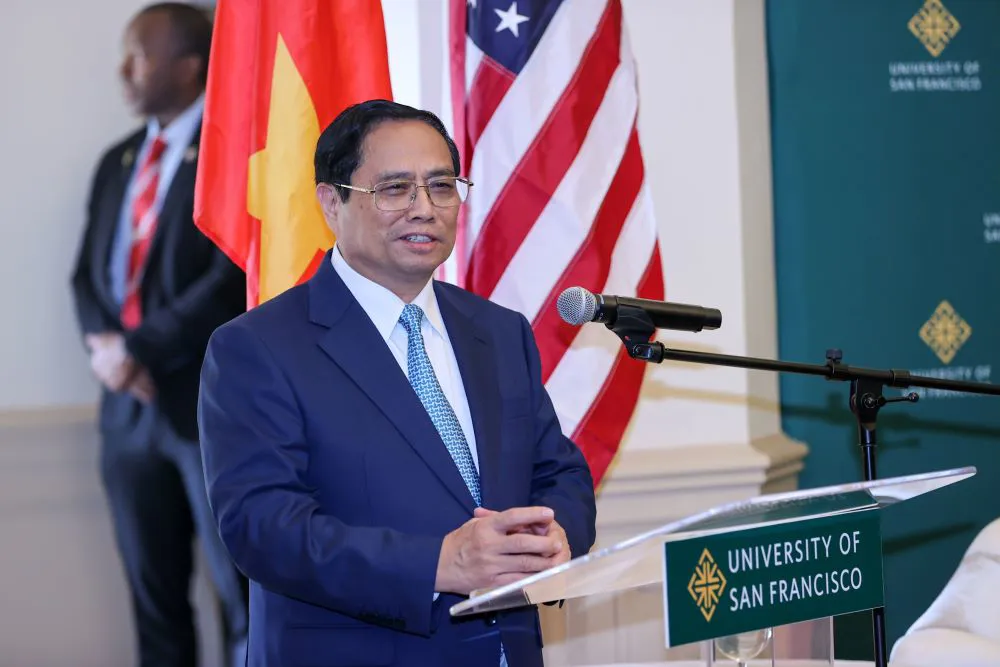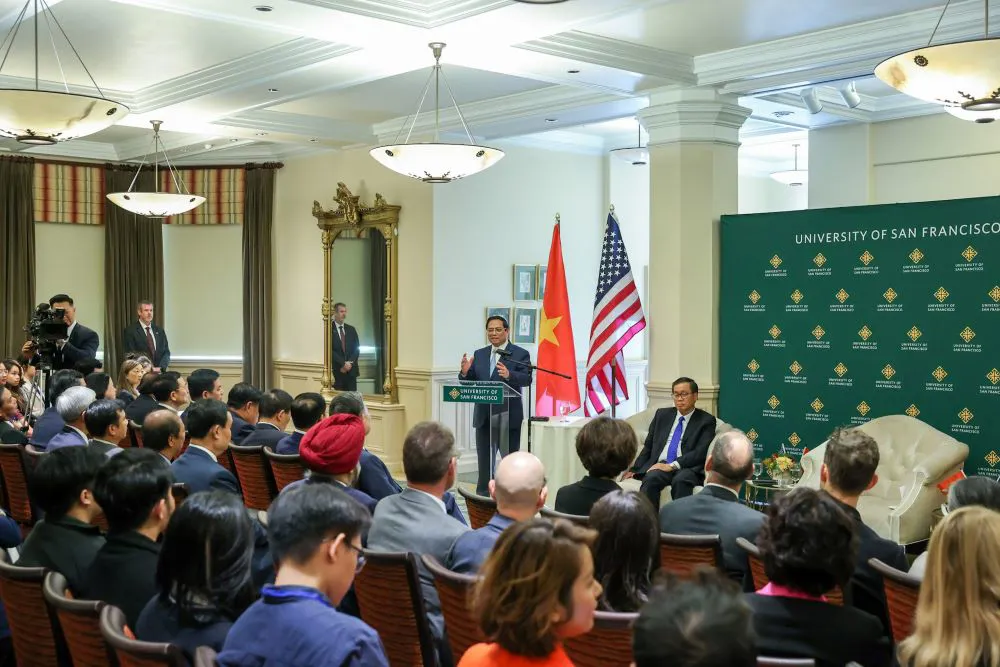Education cooperation with the US helps Vietnam fulfill SDGs: PM
Vietnam views cooperation with the US in education and training, especially in developing a high-quality workforce, as vital for its future.
Education and training, which is among the key pillars of the US-Vietnam bilateral cooperation, would enable Vietnam to achieve the Sustainable Development Goals (SDGs).
| Vietnam’s Prime Minister Pham Minh Chinh speaks at the University of San Francisco on Sept 18 (local time). Photos: Nhat Bac/VGP |
Vietnam’s Prime Minister Pham Minh Chinh said when visiting the University of San Francisco during his trip to the US for the 78th session of the United Nations General Assembly (UNGA78) in New York and other activities.
Education with a focus on high-quality human resources has been highlighted in the Joint Statement on upgrading the relations to a Comprehensive Strategic Partnership issued during US President Joe Biden’s visit to Vietnam last week.
The Prime Minister emphasized that fostering educational cooperation is consistent with Vietnam’s priorities, the current trends, and the US's focus on collaboration with Vietnam.
As stated in the Joint Leaders’ Statement, the US announced concrete plans to assist Vietnam in training a high-quality workforce, contributing to the achievement of Vietnam’s future development goals. Accordingly, the US will encourage American educational institutions to accept a larger number of Vietnamese students.
On this occasion, PM Chinh expected that the University of San Francisco, which leads US educational institutions in cooperating with Vietnam, would promote the partnership and provide more scholarships for Vietnamese students, focusing on innovation, digital transformation, green growth, and inclusive economy.
At the same time, the PM hoped for further cooperation between Vietnamese and US educational institutions, as emphasized in the statement: “The US and Vietnam will encourage the opening of the doors to their universities and laboratories.”
Specifically, both sides would share best practices, scientific advances, and educational opportunities, focusing on supporting the increasing number of Vietnamese students, teachers, scholars, and researchers participating in training and educational programs in the US.
At the same time, Vietnam welcomes the increasing number of US students, scholars, and professors studying, researching, and teaching in Vietnamese higher education institutions. It encourages US universities to build partnerships with Vietnamese higher education institutions, including opening campuses in Vietnam.
As a result, about 50 joint training programs between Vietnamese and American higher education institutions are underway.
PM Chinh also highlighted the role of Vietnamese students studying in the US in general and at the University of San Francisco. He said they are the vital resource of the future, and Vietnam always welcomes them home with preferential policies offered for their return.
Both Vietnam and the US appreciated the community of nearly 30,000 Vietnamese students studying in the US.
| PM Chinh highlights the role of education and training cooperation in US-Vietnam relations. |
Over the years, the launch of Peace Corps operations in Vietnam and the 31st anniversary of the Fulbright Vietnam program underscore the growing cooperation in education and training.
The two countries applauded the work of Fulbright University Vietnam (FUV) and its growing role as a regional hub for public policy training, recognizing the importance of investing in human capital as a critical resource for future prosperity, security, stability, and development.
The impressive new Fulbright University Vietnam (FUV), situated in Ho Chi Minh City, is a crucial pillar of the educational connection and development, according to James Borton, a senior fellow at Johns Hopkins University’s School of Advanced International Studies (SAIS) Foreign Policy Institute.
Founded in 2016, it is the country's first fully independent, nonprofit institution and a cornerstone of the US-Vietnamese partnership. The university is grounded in the American tradition of liberal arts education, which is also rooted in Vietnamese culture and heritage.
Education remains a cornerstone of the US-Vietnam bilateral relationship, and Vietnam is a significant potential market for US educational institutions. The US Commercial Service is prepared to help educational institutions understand market opportunities and challenges and connect them with pre-screened potential Vietnamese educational consultancies/agencies.
Meanwhile, the US Agency for International Development (USAID) is assisting public and private universities in Vietnam to improve institutional governance and sustainability, implement curriculum and teaching reforms, advance technology and innovation, and strengthen partnerships and industry linkages.
Together with the Government of Vietnam and in partnership with US higher education institutions and the private sector, USAID is driving institutional and systemic reforms in higher education that better prepare graduates to succeed in a competitive global market.













